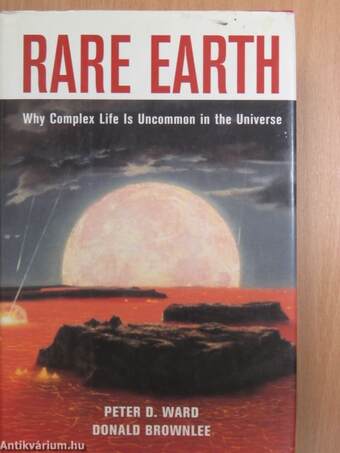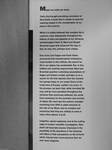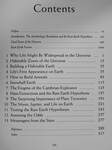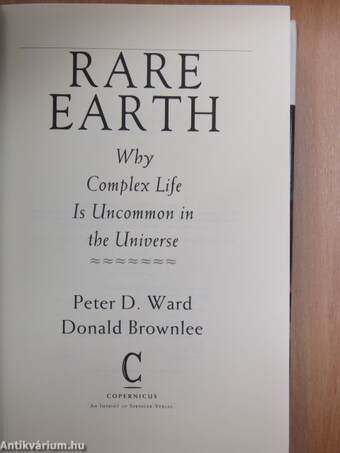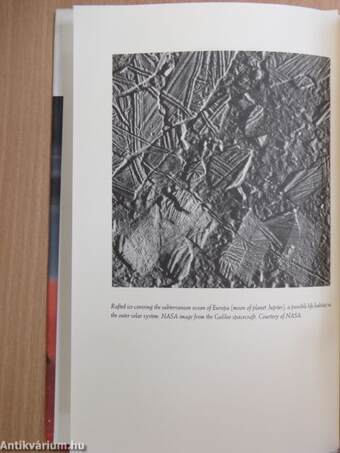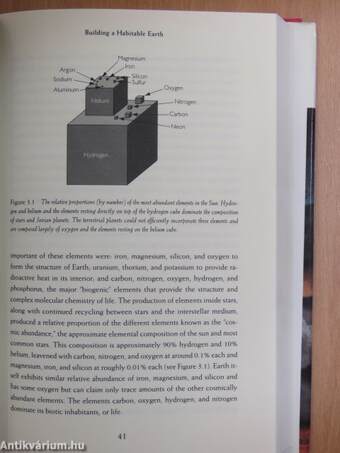1.062.389
kiadvánnyal nyújtjuk Magyarország legnagyobb antikvár könyv-kínálatát

VISSZA
A TETEJÉRE
JAVASLATOKÉszre-
vételek
Rare Earth
Why Complex Life Is Uncommon in the Universe
| Kiadó: | Copernicus |
|---|---|
| Kiadás helye: | New York |
| Kiadás éve: | |
| Kötés típusa: | Ragasztott kemény papírkötés |
| Oldalszám: | 333 oldal |
| Sorozatcím: | |
| Kötetszám: | |
| Nyelv: | Angol |
| Méret: | 24 cm x 16 cm |
| ISBN: | 0-387-98701-0 |
| Megjegyzés: | Fekete-fehér illusztrációkkal. |
naponta értesítjük a beérkező friss
kiadványokról
naponta értesítjük a beérkező friss
kiadványokról
Fülszöveg
ADVANCE PRAISE FOR
RARE EARTH
"In this engaging and superbly written book, the authors present a carefully reasoned and scien-tifically astute examination of the age-old ques-tion—'Are we alone in the Universe?' Their aston-ishing conclusion thatgven simple animal life is
most likely extremely rare in s, the Universe has
^ many profound "" implications. To the M average person, star-
ing up at a dark night sky, full of distant galaxies, it is simply inconceivable that we are alone. Yet, in spite of our wishful thinking, there just may not be other Mozarts or Monets."
—Don Johanson Director, Institute of Humán Origins Arizona State University
"This book offers a fresh and accurate perspec-tive on the mosf profound question in science— Is intelligent life in the Galaxy a dime-a-dozen occurrence or is it a cosmic fluke here on Earth?" ' -Geoff Marcy
Extrasolar planet discoverer University of California, Berkeley
49
"A fabulous book! If we're to believe what we see in the... Tovább
Fülszöveg
ADVANCE PRAISE FOR
RARE EARTH
"In this engaging and superbly written book, the authors present a carefully reasoned and scien-tifically astute examination of the age-old ques-tion—'Are we alone in the Universe?' Their aston-ishing conclusion thatgven simple animal life is
most likely extremely rare in s, the Universe has
^ many profound "" implications. To the M average person, star-
ing up at a dark night sky, full of distant galaxies, it is simply inconceivable that we are alone. Yet, in spite of our wishful thinking, there just may not be other Mozarts or Monets."
—Don Johanson Director, Institute of Humán Origins Arizona State University
"This book offers a fresh and accurate perspec-tive on the mosf profound question in science— Is intelligent life in the Galaxy a dime-a-dozen occurrence or is it a cosmic fluke here on Earth?" ' -Geoff Marcy
Extrasolar planet discoverer University of California, Berkeley
49
"A fabulous book! If we're to believe what we see in the movies, extraterrestrials thrive on every world. But this unique book, written by two of the top scientists in the field, telis a different story. As we know it on Earth, complex life might be very rare, and very precious. For those of us interested in our cosmic heritage, this book is a must-read." —Dávid Levy
Discoverer of Comet Shoemaker-Levy
"Ward and Brownlee take us on a fascinating journey through the deep history of our habitable planet and out into space; in the process they weave a compelling argument that life at the level of an animal should be vastly rarer in the universe than life at the level of a lowly bacterium." -Steven M. Stanley
Author of Children of the Ice Age and Earth and Life Through Time The Johns Hopkins University
Microbial life is common in the universe, but
multicellular animal life is rare. A controv e&ial thesis, but one that is well-researched an^ defended. A 'must' read for anyone who is interested in whether life exists beyond Earth."
"i —James Kasting
Pennsylvania State University
aybe we really are alone.
That's the thought-provoking conclusion of Rare Earth, a book that is certain to have far-reaching impact in the consideration of our place in the cosmos.
While it is widely believed that complex life is common, even widespread, throughout the billions of stars and galaxies of our Universe, astrobiologists Peter D. Ward and Donald Brownlee argue that advanced life may, in fact, be very rare, perhaps even unique.
Ever since Carl Sagan and Frank Drake announced that extraterrestrial civilizations must number in the millions, the search for life in our galaxy has accelerated. But, in this brilliant and carefully argued book, Ward and Brownlee question underlying assumptions of Sagan and Drake's model, and take us on a search for life that reaches from the volcanic hot springs deep on our ocean floors to the frosty face of Európa, Jupiter's icy moon. In the process, we learn that, while microbial life may well be more prevalent throughout the Universe than previously believed, the condi-tions necessary for the evolution and survival of higher life—and here the authors consider everything from DNA to plate tectonics to the role of our Moon—are so complex and precarious that they are unlikely to arise in many other places, if at all.
Insightful, clearly explained, and at the cutting edge of modern scientific investigation, Rare Earth will fascinate anyone interested in the possibility of life elsewhere in the Universe, and offers a fresh perspective on life at home which may be even more precious than we ever have imagined. Vissza
Témakörök
- Idegennyelv > Idegennyelvű könyvek > Angol > Természettudományok > Biológia
- Idegennyelv > Idegennyelvű könyvek > Angol > Természettudományok > Csillagászat
- Idegennyelv > Idegennyelvű könyvek > Angol > Természettudományok > Földrajz
- Természettudomány > Csillagászat > Idegennyelvű
- Természettudomány > Csillagászat > Társtudományok > Egyéb
- Természettudomány > Csillagászat > Világegyetem
- Természettudomány > Földrajz > Általános természeti földrajz > Élővilág
- Természettudomány > Földrajz > Általános természeti földrajz > Földtörténet
- Természettudomány > Földrajz > Idegen nyelv > Angol
- Természettudomány > Biológia > Fajfejlődés > Evolúció (származástan)
- Természettudomány > Biológia > Fajfejlődés > Idegennyelvű
- Természettudomány > Biológia > Fajfejlődés > Az Élet > Általában
Megvásárolható példányok
Nincs megvásárolható példány
A könyv összes megrendelhető példánya elfogyott. Ha kívánja, előjegyezheti a könyvet, és amint a könyv egy újabb példánya elérhető lesz, értesítjük.



